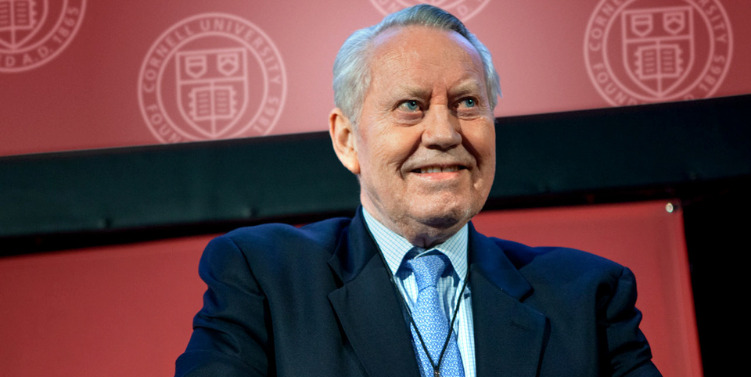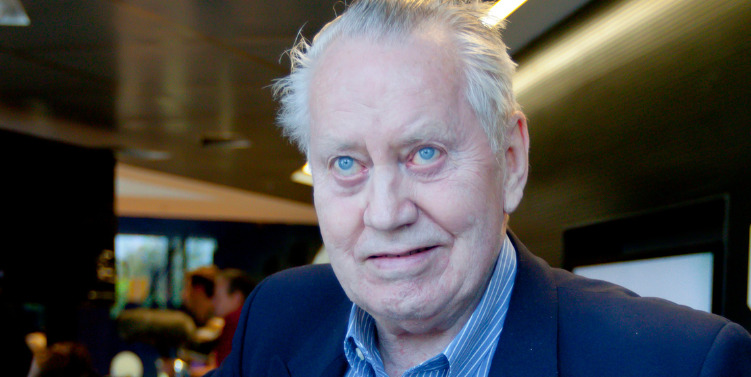Chuck Feeney: Philanthropic world mourns loss of an extraordinary giving hero

The American philanthropist who was called the ultimate example of Giving While Living, Charles ‘Chuck’ Feeney, died this week aged 92. He dedicated his fortune, made from duty free shops, to universities and good causes, giving away US$8 billion across five continents, mostly anonymously.
His adage, “It’s much more fun to give while you’re alive than when you’re dead” is said to have inspired Bill Gates and Warren Buffett to give away their wealth too when they established the Giving Pledge program.
Chuck’s gifts, via the entity The Atlantic Philanthropies to which he signed over his fortune in the 1980s, were focused on education, peacemaking, human rights, health, science and social justice issues. He donated $550 million to Australian organisations, including a number of universities and Philanthropy Australia members that have acknowledged his gifts this week.
He contributed $86 million to the Queensland University of Technology (QUT) as the institution’s single largest donor, it reported on its website. QUT Vice-Chancellor Professor Margaret Sheil AO said his extraordinary legacy would be remembered by staff, students and friends. His gifts helped build the Institute for Health and Biomedical Innovation, the Science and Engineering Centre and the establishment of Health Clinics and Wellbeing Centres at QUT’s Kelvin Grove Campus.
“Chuck was a champion for giving during his lifetime and an exemplar of what can be achieved through philanthropy for the betterment of humanity,” Professor Sheil said.
Former QUT Vice-Chancellor Professor Peter Coaldrake AO said: “His passing is a real milestone because no one has funded Australian higher education and research like he funded it. It was a great honour to know him.”

He also provided $100 million to the University of Queensland, which last year renamed the walkway spanning its Forgan Smith Building as Feeney Way. The university reported that his grants have underpinned many medical breakthroughs, having helped establish UQ’s Institute for Molecular Bioscience, Queensland Brain Institute, the Australian Institute of Bioengineering and Nanotechnology, UQ’s Centre for Clinical Research, the Frazer Institute, the UQ Centre and UQ Art Museum.
QIMR Berghofer medical research institute in Brisbane posted on social media that Chuck was an outstanding champion of medical research, offering substantial support to the expansion of its world-class facilities between 1998 and 2013. His gifts boosted the Institute’s research capacity in cancer, mental health, tropical disease, biosecurity, vaccine development and clinical trials.
QIMR Berghofer Director and CEO Professor Fabienne Mackay said: “Through his incredible generosity, Chuck Feeney transformed medical research at QIMR Berghofer and made an amazing difference to the lives of Queenslanders and people around the world.”
His support was also behind many biomedical investments at the University of Melbourne, as mentioned in the university’s tribute this week. They included a $30 million grant in 2000 to support a new Bio21 Institute building. Other grants included supporting a National Taskforce on Mental Health in Vietnam, student scholarships at International House and supporting a research partnership with the Indigenous communities of Northeast Arnhem Land. In 2016, the Atlantic Fellows for Social Equity Program, led by the University of Melbourne, was established after a $65 million grant from Atlantic Philanthropies.
RMIT University reported that Chuck supported the development of its Vietnam campus. He is said to have provided in excess of US$39 million for RMIT Vietnam’s IT centre, scholarships, a 240-bed student dormitory and sports and leisure facilities.
Chuck gave nearly US$1 billion to his alma mater Cornell University in New York State over more than 30 years. When Atlantic Philanthropies was dissolved in 2020, not only did Chuck achieve his lifetime goal of giving away his wealth, according to Forbes magazine, it became the largest foundation in history to intentionally deploy its entire endowment. On signing the dissolution papers, his message to others of means was: “Try it, you’ll like it.”
Charles was born during the Depression in 1931 to Irish immigrant parents in New Jersey. His working-class roots stayed with him and drove his ambition to share his wealth to the betterment of humanity. He showed an early entrepreneurial flair by starting a sandwich business while at university. He made his vast fortune after founding Duty Free Shoppers in 1980 with Robert W Miller, which became the largest seller of luxury goods in the world, and later by investing in tech start-ups.
Christopher G Oechsli, former president and CEO of The Atlantic Philanthropies, and longtime adviser to Chuck, described in the media how Chuck was passionate about making a difference. “He cared more about being effective at what he did than about amassing wealth or collecting awards. In philanthropy, that meant being present and engaged in an unassuming manner with the people and their work who, with his support, could improve the lives of others in meaningful and lasting ways.”
In 2014, Chuck was honoured with the Forbes 400 Lifetime Achievement Award for Philanthropy, presented to him by Warren Buffett. “Chuck has set an example,” Warren said. “He is my hero and Bill Gates’ hero. He should be everybody’s hero.”
Chuck said in the past that he had made what he called decent but not extravagant provisions for his five adult children and retained about $2 million for himself, a small fraction of the billions he had amassed. At the time of his death on Monday, Chuck was said to live in a modest rented two-bedroom apartment in San Fransisco. He is survived by his second wife, Helga, his children and 16 grandchildren.
Banner image credit: Cornell University